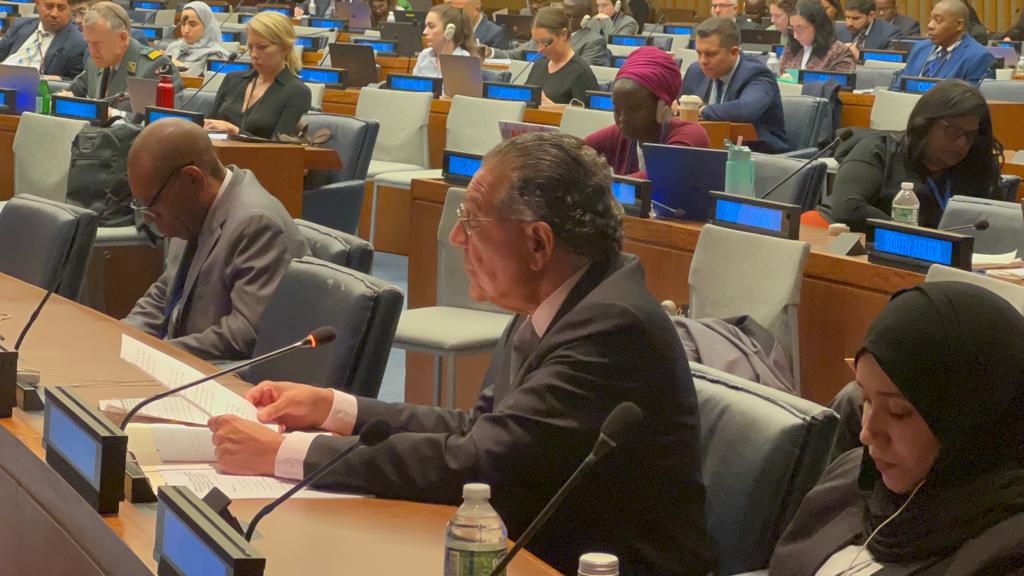
New York, 31 oct 2023 : Statement by Ambassador Munir Akram, Permanent Representative of Pakistan to the United Nations, in the Fourth Committee on the agenda item Comprehensive review of the whole question of peacekeeping operations in all their aspects.
Madam Chair, Let me begin by thanking you for convening today’s debate. I also wish to express my appreciation to the Under-Secretaries General for their informative and comprehensive briefings, and their continuous efforts to ensure the success of UN peacekeeping missions. Pakistan welcomes the 2023 celebrations of the 75th anniversary of UN Peacekeeping. UN peacekeeping is a success story, which should instil pride in the United Nations and its dedicated peacekeepers.
Madam Chair, Pakistan shares this pride with over six decades of dedicated and professional participation in peacekeeping, and having deployed over 230,000 personnel in 47 UN peacekeeping missions. Pakistan also hosts one of the first peacekeeping missions, the UN Military Observer Group in India and Pakistan (UNMOGIP), which observes the ceasefire along the Line of Control in disputed Jammu and Kashmir.
Today, we also pay homage to the 4314 UN peacekeepers from 130 countries who have made the ultimate sacrifice, in the service of the world peace, among them 171 Pakistani peacekeepers. We are meeting at a moment when UN peacekeeping and our peacekeepers are confronting increasingly difficult challenges and unprecedented levels of threats to their safety and security, particularly from improvised explosive devices. Pakistan reiterates its call for accountability for attacks against UN peacekeepers and urges the Secretariat and host countries to work closely to bring perpetrators of crimes against peacekeepers to justice. We are also concerned by the increased misinformation and disinformation against UN Peacekeeping Missions and Peacekeepers which pose a threat to safety and Security of Peacekeepers.
Pakistan appreciates the efforts of the Secretary General to meet the UN’s financial obligations to the T/PCCs. We urge all Member States to fulfil their financial contribution in full, on time, and without conditions. T/PCCs should not endure financial burdens for delayed or non-payment of assessed contributions by some States. We concur with the call by the Secretary-General, in his policy brief on A New Agenda for Peace, for a serious and broad-based reflection on the future of peacekeeping and the need to move toward ‘nimble adaptable models with appropriate and forward-looking transition and exit strategies. An updated strategy for UN peacekeeping should reflect the following elements:
First, a peacekeeping mission must be part of an overall “political strategy” that seeks to address and resolve the underlying causes of conflict and violence e.g. the presence of criminal and terrorist organisations, environmental factors, development deficits, ethnic and tribal differences. Thus, it would be wise to establish a close link between peacekeeping missions and both the UN Security Council and the Peacebuilding Commission;
Second, peacekeeping missions must enjoy the full cooperation and consent of the host country or countries,
Third, the mandates of UN peacekeeping missions adopted by the Security Council must be responsive to the special circumstances of the situations being addressed and be realistic and achievable;
Fourth, each UN Mission should be provided adequate financial, human and material resources to implement its mandate;
Fifth, UN peacekeeping Missions should be provided with the most advanced capabilities – UAVs, radar, early warning, and counter-IED – to enhance their effectiveness as well as the safety and security of peacekeepers;
Sixth, UN peacekeepers should receive adequate training, designed to fulfil their mandate and to avert and respond to anticipated threats in specific Missions;
Seventh, improvements can be made in command and control to ensure a timely response to attacks against civilians and peacekeepers and their patrols and missions.
Eighth, there should be greater accountability for attacks against UN peacekeepers, including greater host country responsibility and the international culpability of perpetrators.
Madam Chair, The distinction between peacekeeping and peace enforcement must always remain clear and distinct. In certain situations where large terrorist or criminal organizations are responsible for wide-spread violence, the international community may be obliged to respond with more robust actions than traditional “peacekeeping”. Decisions for enforcement action should be taken after careful consideration. An enforcement mission would require strong and clear mandates, adequately trained, experienced and equipped troops, allocation of the substantial resources which such missions may require, and above all, the cooperation of the host government, if there is one ineffective control, and of regional governments. In this context, the role of regional organizations could play a critical role in peace enforcement efforts. Pakistan will work with the UN and all interested States to further develop the concept of peace enforcement. In the evolving situations of UN peacekeeping and peace enforcement, regional organizations can play a critical role – through co-deployments and political support. Pakistan is committed to forging peacekeeping partnerships with regional organizations, especially with the members of the African Union and the Organization of Islamic Cooperation (OIC).
Madam Chair, We take this opportunity to thank Ghana for hosting the first UN Peacekeeping Ministerial in Africa on December 5-6. The Peacekeeping Ministerial Preparatory meeting on safety and security of peacekeepers, co-hosted by Pakistan and Japan in Islamabad last August, will contribute to the success of the Ghana ministerial meeting. The Centre of International Peace and Stability (CIPS) in Islamabad where this Conference was held, holds courses, workshops, and seminars for UN peacekeepers and is being transformed into a centre of excellence for conflict prevention, peacekeeping, and peacebuildings.
Madam Chair, The UN’s blue helmets have emerged as the guarantors of peace and harbingers of stability in several parts of the world. We must do everything possible to strengthen their role and capacity and ensure their success.
Sub Editor: Ghufran